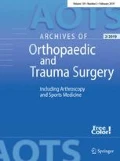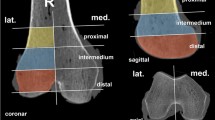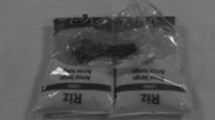Abstract
Introduction: The presence of osteoporosis decreases the success of osteosynthesis, especially in the proximal humerus. Estimation of the bone mineral density (BMD) at the fracture site could aid in the decision making for surgical treatment and potential implant choice with regard to the individual bone properties. BMD measurement at a fracture site is prone to inaccuracies and alternative measurement sites need to be identified. In the case of a proximal humerus fracture, promising alternative measurement sites are at the same contralateral or at a different ipsilateral location. The aim of this study was to determine if the BMD for the humeral head can be predicted by BMD measurements from the ipsilateral distal humerus or the contralateral proximal humerus. Material and methods: Cancellous BMD values were obtained from 88 paired human cadaver humeri (age 75.8±13.5 years) at the humeral head and at the distal metaphyseal area by pQCT. Correlations between BMD values of the ipsi- and contralateral sites were computed. Results: Correlations between proximal and distal BMD values within one bone were moderate for both left (R2=0.37) and right humeri (R2=0.40). BMD comparison between left and right humeri revealed high correlations for both the distal (R2=0.90) and the proximal humerus (R2=0.74) (all P<0.01). Elderly specimen (≥70 years) showed better intersite correlations between all regions than younger specimen (<70 years). Conclusion: High correlations between contralateral BMD values may be the result of similar biomechanical loading conditions. Although a relationship between proximal and distal bone quality of the same bone was found, the moderate coefficient suggests that ipsilateral measurements do not provide a good prediction of humeral head BMD. Bone quality at the humeral head is best predicted by BMD measurements at the contralateral location rather than the ipsilateral distal site.





Similar content being viewed by others
Reference
Abrahamsen B, Hansen TB, Jensen LB, Hermann AP, Eiken P (1997) Site of osteodensitometry in perimenopausal women: correlation and limits of agreement between anatomic regions. J Bone Miner Res 12:1471–1479
Amling M, Herden S, Posl M, Hahn M, Ritzel H, Delling G (1996) Heterogeneity of the skeleton: comparison of the trabecular microarchitecture of the spine, the iliac crest, the femur, and the calcaneus. J Bone Miner Res 11:36–45
Broadbent MR, Quaba O, Hadjucka C, McQueen MM (2003) The epidemiology of multifocal upper limb fractures. Scand J Surg 92:220–223
Cheng XG, Lowet G, Boonen S, Nicholson PH, Van der Perre G, Dequeker J (1998) Prediction of vertebral and femoral strength in vitro by bone mineral density measured at different skeletal sites. J Bone Miner Res 13:1439–1443
Ciarelli MJ, Goldstein SA, Kuhn JL, Cody DD, Brown MB (1991) Evaluation of orthogonal mechanical properties and density of human trabecular bone from the major metaphyseal regions with materials testing and computed tomography. J Orthop Res 9:674–682
Eckstein F, Lochmüller EM, Lill CA, Kuhn V, Schneider E, Delling G, Müller R (2002) Bone strength at clinically relevant sites displays substantial heterogeneity and is best predicted from site-specific bone densitometry. J Bone Miner Res 17:162–171
Fankhauser F, Schippinger G, Weber K, Heinz S, Quehenberger F, Boldin C, Bratschisch G, Szyszkowitz R, Georg L, Friedrich A (2003) Cadaveric-biomechanical evaluation of bone-implant construct of proximal humerus fractures (Neer type 3). J Trauma 55:345–349. DOI 10.1097/01.TA.0000033139.61038.EF
Frankle M, Herscovici DJ, DiPasquale TG, Vasey MB, Sanders RW (2003) A comparison of open reduction and internal fixation and primary total elbow arthroplasty in the treatment of intraarticular distal humerus fractures in women older than age 65. J Orthop Trauma 17:473–480
Goodsitt MM, Christodoulou EG, Larson SC, Kazeroonie EA (2001) Assessment of calibration methods for estimating bone mineral densities in trauma patients with quantitative CT: an anthropomorphic phantom study. Acad Radiol 8:822–834
Groll O, Lochmüller EM, Bachmeier M, Willnecker J, Eckstein F (1999) Precision and intersite correlation of bone densitometry at the radius, tibia and femur with peripheral quantitative CT. Skeletal Radiol 28:696–702. DOI 10.1007/s002560050576
Haapamaki VV, Kiuru MJ, Koskinen SK (2004) Multidetector CT in shoulder fractures. Emerg Radiol 11:89–94. DOI 10.1007/s 10140-004-0376-x
Haapasalo H, Kontulainen S, Sievanen H, Kannus P, Jarvinen M, Vuori I (2000) Exercise-induced bone gain is due to enlargement in bone size without a change in volumetric bone density: a peripheral quantitative computed tomography study of the upper arms of male tennis players. Bone 27:351–357
Hepp P, Lill H, Bail H, Korner J, Niederhagen M, Haas NP, Josten C, Duda GN (2003) Where should implants be anchored in the humeral head? Clin Orthop 415:139–147. DOI 10.1097/01.blo.0000092968.12414.a8
Hertel R (2004) Fractures of the proximal humerus in osteoporotic bone. Osteoporos Int 16(Suppl 2):1–9. DOI 10.1007/s 00198-004-1714-2
Huopio J, Kroger H, Honkanen R, Saarikoski S, Alhava E (2000) Risk factors for perimenopausal fractures: a prospective study. Osteoporos Int 11:219–227. DOI 10.1007/s001980050284
Kawashima T, Uhthoff HK (1991) Pattern of bone loss of the proximal femur: a radiologic, densitometric and histomorphometric study. J Orthop Res 9:634–640
Koval KJ, Blair B, Takei R, Kummer FJ, Zuckerman JD (1996) Surgical neck fractures of the proximal humerus: a laboratory evaluation of ten fixation techniques. J Trauma 40:778–783
Kuiper JW, van Kuijk C, Grashuis JL, Ederveen AG, Schutte HE (1996) Accuracy and the influence of marrow fat on quantitative CT and dual-energy X-ray absorptiometry of the femoral neck in vitro. Osteoporos int 6:25–30
Lill H, Hepp P, Gowin W, Oestmann JW, Korner J, Haas NP, Josten C, Duda GN (2002) Age- and gender-related distribution of bone mineral density and mechanical properties of the proximal humerus. Rofo 174:1544–1550. DOI 10.1055/s-2002-35944
Lill H, Hepp P, Korner J, Kassi JP, Verheyden AP, Josten C, Duda GN (2003) Proximal humeral fractures: how stiff should an implant be? A comparative mechanical study with new implants in human specimens. Arch Orthop Trauma Surg 123:74–81. DOI 10.1007/s00402-002-0465-9
Link TM, Koppers BB, Licht T, Bauer J, Lu Y, Rummeny EJ (2004) In vitro and in vivo spiral CT to determine bone mineral density: initial experience in patients at risk for osteoporosis. Radiology 231:805–811
Maldonado ZM, Seebeck J, Heller MO, Brandt D, Hepp P, Lill H, Duda GN (2003) Straining of the intact and fractured proximal humerus under physiological-like loading. J Biomech 36:1865–1867 DOI 10.1016/S0021-9290(03)00212-4
Mosekilde L (2000) Age-related changes in bone mass, structure, and strength - effects of loading. Z Rheumatol 59(Suppl 1):1–9
Nordin BE, Chatterton BE, Schultz CG, Need AG, Horowitz M (1996) Regional bone mineral density interrelationships in normal and osteoporotic postmenopausal women. J Bone MinerRes 11:849–856
Olschewski E, Murray P, Buckley R, Fennell C, Powell JN (2001) Assessment of osteoporosis using standard radiographs of the wrist. J Trauma 51:912–916
Park MC, Murthi AM, Roth NS, Blaine TA, Levine WN, Bigliani LU (2003) Two-part and three-part fractures of the proximal humerus treated with suture fixation. J Orthop Trauma 17:319–325
Saitoh S, Nakatsuchi Y, Latta L, Milne E (1994) Distribution of bone mineral density and bone strength of the proximal humerus. J Shoulder Elbow Surg 3:234–242
Seebeck J, Goldhahn J, Städele H, Messmer P, Morlock MM, Schneider E (2004) Effect of cortical thickness and cancellous bone density on the holding strength of internal fixator screws. J Orthop Res 22:1237–1242. DOI 10.1016/j.orthres.2004.04.001
Szyszkowitz R, Segg W, Schleifer P, Cundy PJ (1993) Proximal humeral fractures. Management techniques and expected results. Clin Orthop 292:13–25
Tingart MJ, Apreleva M, von Stechow D, Zurakowski D, Warner JJ (2003) The cortical thickness of the proximal humeral diaphysis predicts bone mineral density of the proximal humerus. J Bone Joint Surg Br 85:611–617. DOI 10.1302/0301-620X.85B4.12843
Tingart MJ, Bouxsein ML, Zurakowski D, Warner JP, Apreleva M (2003) Three-Dimensional Distribution of Bone Density in the Proximal Humerus. Calcif Tissue Int 73:531–536
Wong M, Papa A, Lang T, Hodis HN, Labree L, Detrano R (2005) Validation of thoracic quantitative computed tomography as a method to measure bone mineral density. Calcif Tissue Int 76:7–10. DOI 10.1007/s00223-004-0020-5
Acknowledgement
The authors wish to thank R. Schoch, Institute for Pathology Basel, for the support and Rosemary Thompson for final revision.
Author information
Authors and Affiliations
Corresponding author
Rights and permissions
About this article
Cite this article
Diederichs, G., Korner, J., Goldhahn, J. et al. Assessment of bone quality in the proximal humerus by measurement of the contralateral site: a cadaveric analyze. Arch Orthop Trauma Surg 126, 93–100 (2006). https://doi.org/10.1007/s00402-006-0103-z
Received:
Published:
Issue Date:
DOI: https://doi.org/10.1007/s00402-006-0103-z




